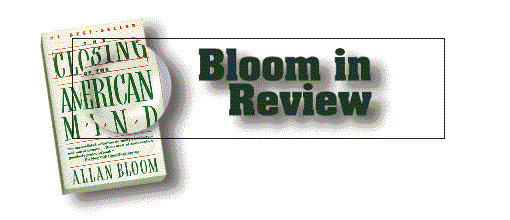

Ten years after Allan Bloom's best-seller became one of the nation's most talked-about books, a gathering of scholars reopened the debate on The Closing of the American Mind.
By
John Easton
Times have changed," begins one of Cole Porter's most famous lyrics, "and we've often rewound the clock, since the Puritans got a shock, when they land-ed on Plymouth Rock." College students, we've long been told, have changed, too, perhaps not for the better.
"I have for more than thirty years, with the most intense interest, watched and listened to students," wrote Allan Bloom in the preface to his 1987 best-seller, The Closing of the American Mind. Contemporary collegians, asserted Bloom, had lost their passion for knowledge, what Plato called the "erotic" element in education.
"Students these days are, in general, nice," conceded Bloom, PhB'49, AM'53, PhD'55, then a professor in the Committee on Social Thought, but "spiritually detumescent." Lacking the passion for knowledge, even belief in the possibility of knowing, Bloom argued, they now watched movies instead of reading the classics. They hearkened only to pulsating primitive music. They knew a little bit about everything and cared deeply about nothing. "The world has gone mad today, and good's bad today, and black's white today, and day's night today," was Porter's briefer version.
"Anything Goes" quickly became a smash hit, boosting Porter from a track record of moderate successes to the leading lyricist of his day. That Bloom's composition would be a best-seller was less predictable. A wide-ranging academic, best known for his teaching and for his translations of Plato and Rousseau, Bloom only wrote the book-an expansion of a National Review article drawn from his late-night musings and lunchtime complaints-at the urging of U of C colleague Saul Bellow, X'39, who offered to pen the foreword. It became the publishing phenomenon of the decade, selling more than one million copies and turning Bloom, as he would later joke, into the academic equivalent of a rock star.
Some worshipped the book, as much for its confrontational style as its provocative substance. Others viciously condemned it as elitist, antifeminist, and antiscience. Ten years after its publication, and five years after the author's death, Bloom's tome continues to inspire, provoke, and dismay. Those were precisely the emotions that Nathan Tarcov-Bloom's former student and his successor as director of the University's John M. Olin Center for Inquiry into the Theory and Practice of Democracy-wanted to evoke when putting together a three-day conference, The Closing of the American Mind Revisited, held on campus May 16-18 to commemorate the tenth anniversary of what Tarcov described in his introduction to the conference as "one of the central documents in continuing debates regarding the state of American universities."
The conference, featuring a broad range of participants--including columnist Stanley Crouch, philosopher Robert Pippin, and novelist Joyce Carol Oates--convened on Friday afternoon in Ida Noyes Hall before an overflowing crowd. While support staff scurried to find more folding chairs to accommodate the audience, the first speaker-Harvey Mansfield, the William R. Kenan, Jr., professor of government at Harvard University-started the show with a bang by tearing into the concept of political correctness.
A clever, dapper, neatly coiffed, socially conservative gentleman, Mansfield was the closest thing to a living Bloom available. He turned to Bloom's usual sources (Plato, Aristophanes, Hobbes, Hegel, Nietzsche, Freud) to attack Bloom's usual targets (feminists, Marxists, and the '60s) with Bloomian imagination and audacity. Political correctness has impaired our ability to communicate, he suggested. It goes after "the unintended slight offered without malice by otherwise decent people." He offered playful examples from real estate, where "one risks a law suit today if an ad refers to a `master bedroom' (which smacks of sexism), `walking distance' (insensitive to the disabled), or `family room' (omits singles) . . ."
A balding, moderately rumpled Ira Katznelson, the Ruggles professor of political science and history at Columbia University, responded by defending the contributions of the 1960s. He insisted that the era had opened up universities to merit as well as diversity and broadened the curriculum, moving "so much of the human experience from a zone of ignorance to a zone of inquiry." In the question period that followed, Mansfield and Katznelson argued whether universities had improved immeasurably since the Sixties (Katznelson) or gone straight down the tubes (Mansfield). Was diversity good or bad? Were students better or worse?
Surprisingly, panelist Rohit Khanna-a third-year student in the College-supported the hell-in-a-handbasket notion. Bloom's criticisms were "on the mark" for the great majority of students, even at the best colleges, said Khanna. As the students in the audience began to cringe, to cough, to creep to the edges of their seats, Khanna proclaimed that most of his peers don't care about history, about politics, ideas, even the Great Books. But the few, the very few, care deeply. They know the difference between art and rubbish. They are drawn to the classics and revere their authors. Concluding his talk with the lyrics of a drinking song, reportedly sung by the young Winston Churchill, Khanna emphasized that today's very best students respect the giants of the past and reasonably aspire to become the giants of the future.
This prompted conference participant Richard Zinman, professor of political theory at Michigan State, to begin the question period by asking Khanna: "Who are you guys, and why should we be lulled into believing you're not dangerous?"
Continue reading "Bloom in Review"
John Easton, AM'76, is a contributing editor for the Magazine.
Go to:
- INVESTIGATIONS
- CHICAGO JOURNAL
- LETTERS
- CHICAGOPHILE
- Feature story: "Clean-up hitter"
- Feature story: "Waving the Chicago flag"
- Feature story: "Between two Worlds"
- Feature
story: "Bloom in review"
- CLASS NEWS, including ALUMNI AWARDS
- DEATHS
- BOOKS BY ALUMNI
- IN THE CLUBS
Return to August 1997 Table of Contents